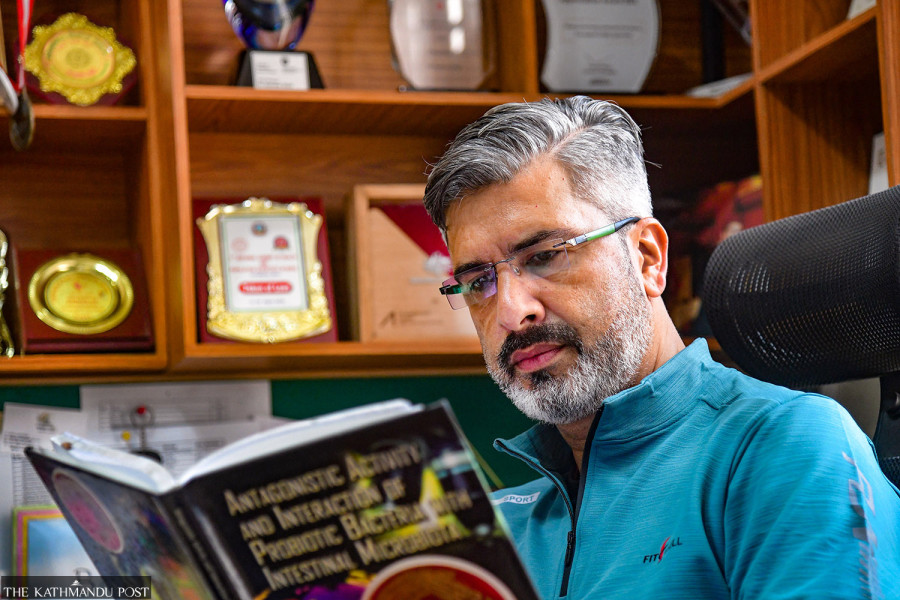Books
‘I have a newfound interest in Nepali authors’
Sameer Mani Dixit, a biomedical scientist and TV producer/presenter, on his favourite books growing up, how his preferred genres changed over the years, and how he chooses his books.
Sameer Mani Dixit is a biomedical scientist working in Nepal’s public health sector and also a producer/presenter for Galaxy This Morning Live (a morning TV on Galaxy 4K). In this interview with the Post, Dixit shares how his life has always revolved around books, his favourite books, and the subject on which he would like to write a book on.
What part did reading play in your childhood?
I was very much encouraged to read at home and school—exchanging books with friends—but I read mostly on my own device since I loved books and magazines.Thanks to the library at St. Xavier’s School, Jawalakhel, which I attended as a boy, I would get my hands on the latest Famous Five books—a children’s adventure novel written by Enid Blyton. I’d also read other books at regular intervals as well.
Can you name a book you’re grateful to have read back then?
Definitely the Famous Five series. It made me really enjoy fiction, and I would always look forward to reading the next in the series, as they came out in inconsistent intervals.
Now an established personality in your fields of work, how exactly have your preferences in genres changed since your childhood?
Actually, my preferences for fiction have remained the same. I love fiction, especially the thriller/spy and horror genres. Stephen King was and continues to be a favourite author of mine.
However, these days, I have had a newfound interest in Nepali authors and their creations. I’ve taken up a liking for reading about social issues as well.
Which books do you think have had the most impact on you as a person and professional?
I haven’t experienced such an impact yet, but ‘All Roads Lead North’ by Amish Mulmi opened up my mind and reminded me about our recurring links to our northern neighbour, China, something that wasn’t apparent to me before reading the book.
‘The Code Breaker’ by Walter Isaacson, a book about the discovery of CRISPR—a family of DNA sequences in bacteria-like organisms—has reaffirmed my belief in advances in biotechnology, my area of interest.
As a busy biomedical scientist and TV personality, how do you decide which books are reliable and worth your time?
I go for books in my preferred genres and popular authors that I am familiar with, for example, Dan Brown or John Grisham. In the case of Nepali books, I stick with authors like Subin Bhattarai and Buddhi Sagar. I also choose my books by reading book reviews published in reliable publications.
Unfortunately, I don’t have as much time to read as I’d like, but I do try to make time where possible. Yuval Noah Harari’s ‘Sapiens: A Brief History of Humankind’ and ‘Homo Deus’ have been on my to-be-read list for about six months!
Have you ever considered writing a book for the general public? If so, what would it be about?
I was very lucky to have published my book on interactions of probiotic bacteria with intestinal microbiota based on my PhD research—which a fair few people bought. But if I were to write for the general public, I would most likely write about the adventures of starting my research institution, something that tells the story of working in the field of science and health in Nepal. I am already keeping notes on the subject.
Additionally, I have regularly contributed op-eds on topics of health and science (including the Kathmandu Post), and I plan to continue that. I might consider combining my knowledge and personal experience in a book one day.
Can you name the top books that you’ve read and would want others to read as well?
‘Nepal Nexus’ by Sudheer Sharma
‘The Lost Symbol’ by Dan Brown
‘Prey’ by Michael Crichton
‘The Code Breaker’ by Walter Isaacson
‘Airframe’ by Michael Crichton
‘Nathiya’ by Saraswati Pratikshya




 9.7°C Kathmandu
9.7°C Kathmandu









